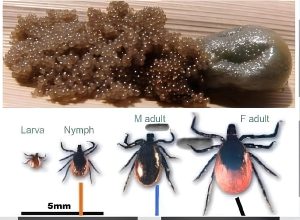
Attention, Gardeners: Beware of Jelly-Like Nest in Your Garden! Here’s What You Need to Know
Gardening is a beloved pastime for many, offering relaxation, beauty, and the satisfaction of nurturing plants to thrive. However, amidst the joy of cultivating our green spaces, there are occasional surprises lurking that can pose risks to our health and the well-being of our gardens. One such discovery that has been causing concern among gardeners in Western New York State, USA, is the presence of small piles of jelly-like balls, resembling translucent pearls, found in garden beds and other outdoor areas.
What are these Jelly-Like Balls?
These jelly-like balls, often found nestled in moist, shaded areas of gardens, are not harmless garden ornaments or innocent curiosities. In fact, they are the egg masses of ticks, those notorious blood-sucking arachnids that can transmit diseases such as Lyme disease, Rocky Mountain spotted fever, and more. These egg masses, though initially inconspicuous, harbor hundreds of tick eggs within them, waiting to hatch and emerge as hungry larvae in a matter of weeks.
Why Should You Act Immediately?
Upon discovery of these jelly-like nests, immediate action is crucial to prevent the hatching of tick larvae and mitigate the risk of tick-borne diseases. These measures include:
- Set Them on Fire:
- One effective method of destroying these egg masses is to carefully set them on fire. However, this should be done with caution to prevent any fire hazards.
- Soak in Isopropyl Alcohol:
- Alternatively, soaking the nests in isopropyl alcohol can also effectively destroy the eggs. Again, caution should be exercised when handling alcohol and flammable materials.
- Wear Gloves:
- It is highly recommended to wear gloves or protective gear when handling the nests to avoid direct contact with tick eggs and potential pathogens.
Why are Tick Bites Dangerous?
Tick bites pose significant health risks due to the pathogens they can transmit. Lyme disease, in particular, is a prevalent concern in many regions, including Western New York State. Symptoms of Lyme disease may include fever, headache, fatigue, and a characteristic “bull’s-eye” rash. If left untreated, Lyme disease can lead to serious complications affecting the joints, heart, and nervous system.
How to Minimize Tick Exposure in Your Garden:
While it may be unsettling to encounter tick egg masses in your garden, there are steps you can take to minimize tick exposure and safeguard your health:
- Maintain a Tidy Garden: Regularly clear debris, leaf litter, and overgrown vegetation where ticks may hide.
- Create Tick Barriers: Consider using wood chips or gravel to create a barrier between wooded areas and your garden.
- Use Tick Repellents: Apply insect repellents containing DEET or permethrin to clothing and exposed skin when working in the garden.
- Wear Protective Clothing: Dress in long sleeves, pants, and closed-toe shoes to minimize skin exposure to ticks.
- Perform Tick Checks: After spending time outdoors, thoroughly check yourself, family members, and pets for ticks, paying close attention to hidden areas like the scalp, armpits, and groin.
Conclusion:
Gardening brings us closer to nature and provides countless benefits, but it also requires vigilance and awareness of potential hazards. The discovery of jelly-like tick egg masses in gardens serves as a reminder of the importance of proactive tick prevention measures and prompt action to safeguard our health and well-being. By staying informed and taking preventive measures, gardeners can continue to enjoy their outdoor pursuits safely and confidently.
Popular Questions and Answers:
- What are these jelly-like balls found in gardens?
- These jelly-like balls are egg masses of ticks, containing hundreds of tick eggs.
- How should you dispose of these egg masses?
- They should be destroyed immediately by setting them on fire or soaking them in isopropyl alcohol.
- Why is it important to act quickly upon finding these egg masses?
- Tick eggs hatch into larvae in a few weeks, posing a risk of tick bites and tick-borne diseases.
- Where have these jelly-like nests been reported?
- Reports of these nests have been particularly prevalent in Western New York State, USA.
- What precautions should you take when handling the nests?
- It’s crucial to wear gloves or protective gear to avoid direct contact with tick eggs and potential pathogens.
- What diseases can ticks transmit?
- Ticks can transmit diseases such as Lyme disease, Rocky Mountain spotted fever, and more.
- What are the symptoms of Lyme disease?
- Symptoms of Lyme disease may include fever, headache, fatigue, and a characteristic “bull’s-eye” rash.
- How can you minimize tick exposure in your garden?
- Maintaining a tidy garden, using tick repellents, wearing protective clothing, and performing tick checks are essential preventive measures.
- What should you do if you find a tick on yourself or a family member?
- Remove the tick promptly using fine-tipped tweezers and clean the bite area with soap and water
Certainly! Here are some secrets and tips related to the article about the jelly-like tick egg masses found in gardens:
- Early Detection is Key:
- Regularly inspect your garden for any signs of tick egg masses, especially in shaded and moist areas where ticks thrive.
- Educate Yourself:
- Learn to identify tick egg masses accurately to take appropriate action promptly.
- Maintain Garden Hygiene:
- Keep your garden clean and tidy by removing leaf litter, debris, and overgrown vegetation where ticks and their egg masses may hide.
- Use Protective Gear:
- When working in your garden, wear long sleeves, pants, gloves, and closed-toe shoes to minimize skin exposure to ticks and potential tick bites.
- Keep Pets Safe:
- Protect your pets from tick bites by regularly checking them for ticks, using tick preventatives, and avoiding areas where ticks are prevalent.
- Dispose of Egg Masses Safely:
- Follow proper disposal methods such as burning or soaking egg masses in isopropyl alcohol to prevent hatching and further infestation.
- Take Prompt Action:
- Act immediately upon discovering tick egg masses to prevent the hatching of tick larvae and reduce the risk of tick-borne diseases.
- Educate Others:
- Share information about the presence of tick egg masses and the importance of taking preventive measures with friends, family, and fellow gardeners.
- Monitor Your Health:
- Be vigilant for any symptoms of tick-borne diseases after spending time in your garden, and seek medical attention promptly if you suspect you’ve been bitten by a tick.
- Communicate with Local Authorities:
- Inform local health authorities or garden associations about the presence of tick egg masses in your area to raise awareness and coordinate efforts to address the issue.
- Implement Tick Control Measures:
- Consider implementing tick control measures in your garden, such as using tick-repellent plants, installing tick barriers, or employing professional pest control services.
- Regularly Check for Ticks:
- Perform regular tick checks on yourself, family members, and pets after spending time outdoors, especially in areas where ticks are prevalent.
- Monitor Your Garden Environment:
- Keep track of environmental conditions in your garden, such as temperature and humidity, which may affect tick activity and egg hatching.
- Stay Informed:
- Stay up-to-date on local tick activity, prevalence of tick-borne diseases, and recommended preventive measures through reputable sources such as health departments and gardening organizations.
- Collaborate with Neighbors:
- Work together with neighbors to address tick infestations collectively, as ticks can move between properties and exacerbate the problem.
By following these secrets and tips, you can effectively manage and mitigate the risk of tick infestations in your garden, ensuring a safer and more enjoyable outdoor experience for yourself, your family, and your pets.












